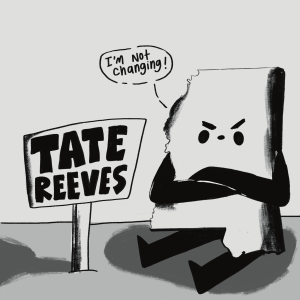
Gov. Tate Reeves secured the Mississippi governorship for four more years last Tuesday to the disapproval of many Mississippians and the evident approval of more. Lower voter turnout than the previous gubernatorial elections, voting day mishaps and political logistics all seemed to work in Reeves’ favor, giving us our result.
It is finally time to think about how the events unfolded to give the incumbent Reeves a comfortable win over Democratic candidate Brandon Presley.
Can Reeves’ victory be credited to the financial and political power an incumbent has? Was it partisan politics? Did Reeves have better attack ads?
The answers to these questions are yes, yes and a resounding no. The Tainted Tate Reeves ad drew much attention to a scandal that many Mississippians overlooked while Reeves’ PR team chose to target Presley’s status as a candidate backed by Democrats nationally, something that is not uncommon. In fact, Reeves himself received millions in donations from Republicans across the country.
Reeves’ win is no surprise, considering the Republicans’ best bet for re-election is boosting their incumbent. This idea is one that we see on the national stage, too.
Tate achieved the ordinary by winning re-election as a Republican, but the results of the election give me optimism. Presley put fear in the Republican party that will hopefully keep both sides working towards making Mississippi more productive. Presley even scared the public speaking guru Reeves into a public debate that was truly hard to watch. That one hour of programming was closer to an episode of “Judge Judy” than it was to a debate between two individuals running to be the highest-ranking state official.
This election has emphasized a truth that some Mississippians find unbearable, and others find heart-warming — Mississippi can’t stand change. The gears grind slowly in Mississippi and Reeves, coming off a rough four-year term, had that to his advantage.
The thought of a Democratic governor running Mississippi was bone-chilling enough for many Republican voters to hightail it to the voting booths on election day.
Still, voting was down overall across the board for the state. Compared to the 2019 Mississippi gubernatorial election, the 2023 election saw 11% fewer eligible voters cast ballots. This is a reflection of the unconcerned attitude of Mississippi’s voter base and the historical partisan bias of certain counties, but it may also be a suggestion that something is not right with the way we vote.
Democratic voters showed up to take down Reeves once and for all, but the number of voters in this election proved to be the problem. Democracy was taken half-seriously by non-voters. In Lafayette County, for example, only 44% of the county showed up to vote in the most important election the state holds.
Presley made it clear after his concession that the governor’s seat is where he feels he belongs, and the coming elections will be interesting to see. Can Mississippi turn the tide and begin to focus on issues other than party membership?
In the next election, it’s important to think of those without health care, hospitals closing, lack of resources and public education rather than what party stays in power.
In the meantime, let us help make the state a better place and not expect or rely on political figures to do all the work.
David Ramsey is a junior public policy leadership major from Madison, Miss.


























